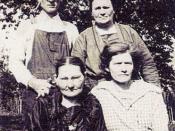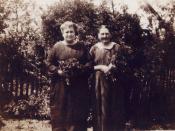Michael Henchard's Confrontation of Moral Beliefs
In the novel, The Mayor of Casterbridge, many circumstances and external forces compel Michael Henchard to confront his moral beliefs.
Firstly, unexpected action, idea and notion under specific condition can confront one's moral beliefs. The novel opens with Henchard, his wife and baby daughter arriving at Weydon-Priors. Mr. Henchard is a hay-trusser who hopes to find work there. However, he is depressed to learn from a local that no jobs are available. Henchard goes to a refreshment tent and signals the "furmity woman" to lace his drink with rum. After drinking four basins, Henchard becomes overbearing, argumentative, and quarrelsome. He vents his bitterness at being unemployed on his marriage. He begins to talk of the ruin of his life by getting married early. Impulsively, he offers to sell his wife for five guineas. A sailor named Newson buys her and her daughter, Elizabeth-Jane.
Then, Henchard is fallen asleep due to the liquor. In this incident, the circumstances and external forces compel Henchard to confront his moral beliefs. Since he was drunk and upset due to his unemployed when he sold his wife and daughter, we can assume that his action does not represent his moral beliefs. In addition, from Henchard's action and vow after he wakes from a drunken stupor, we can reason that he believes the sale of his wife is immoral. In remorse for his actions, Henchard vows not to drink for twenty-one years. Also, he searches long and hard for his wife and child. These facts shows that deep in his soul, he is regretful and full of guilt. Henchard's frustration and the effects of liquor compel Henchard to confront his moral beliefs. In this incident, the circumstances and external forces are surprisingly strong that they drive his action...



Ending
You made some really good points throughout your essay, perhaps the conclusion could have been a bit longer.
0 out of 0 people found this comment useful.